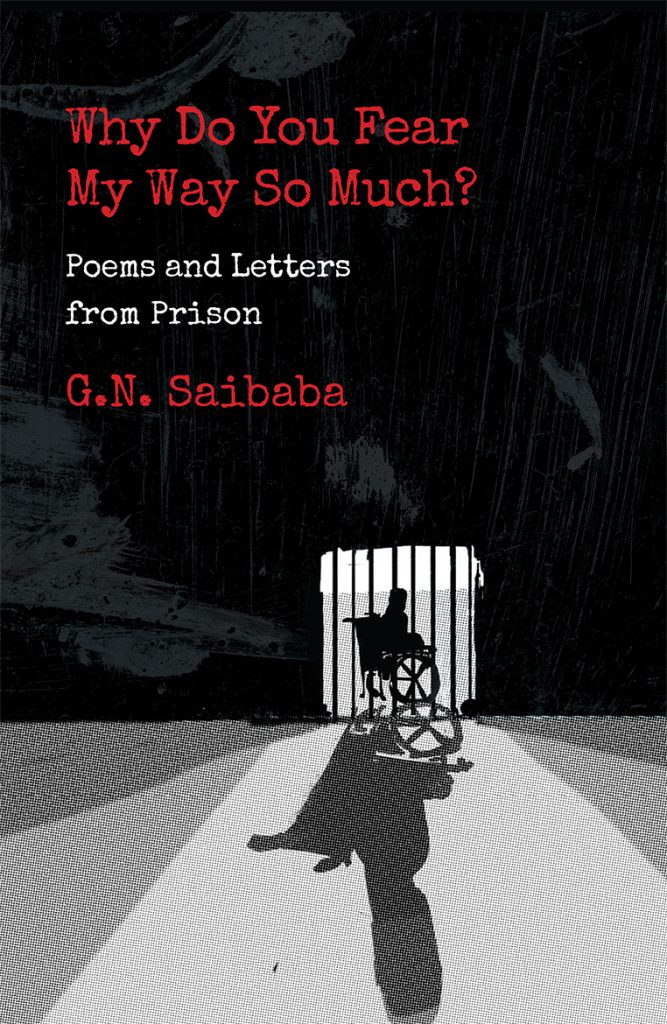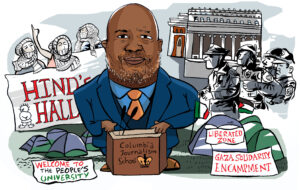

Excerpted from Why Do You Fear My Way So Much: Poems and Letters from Prison by G. N. Saibaba. Published by Speaking Tiger Books, 2022.
A Letter to Dear Students and My Fellow Teachers
I dream of being in my classroom
day and night fettered behind
the strong iron beams
of my tiny solitary prison cell.
I see you, talk to you
and hug you by the force
of my frail and challenged life
in my unchained mind’s eye
as the desire for freedom
flows through the sinews
and veins of my bloodstream
even as I am caged
far away from you.
Teaching is my forte,
breath and life, you know
I embraced literature
for it clasps us with our troubled histories,
philosophies and economics
of pangs of pain, tears,
fears and hopes
for a bright new day.
The cage of lies,
seditious clauses of law
and conspiratorial confabulations
confine and keep me away
from your intimate and critical
engagement with knowledge
and warm affection for the
liberty of the trampled earth.
Dear friends,
I have lived all my conscious life on the campuses of learning and teaching in search of knowledge, love and freedom. In the course of this search, I learnt that freedom for a few was no freedom. I began to study histories, philosophies and literatures with more eagerness and critical engagement. That led me to look around myself closely. I travelled across and met people living in sub-human conditions. I realised that they never tasted freedom very much like me. I understood that castes and freedom can never co-exist. I began to speak to myself. Then I slowly started to speak to my fellow beings on my journey. I grasped of a great void of silence around me. I saw a society of silence. I dashed myself against the boulders of silence. I brutally wounded myself. A vast majority of the multitudes have never been allowed to break their silence. Centuries of silence solidified in our lives below the high and barren rocks of argumentative India. I desired to break the prison house of silence. I struggled within myself. The rocks were hard to move. I realised that I carried within myself our silent society. It wasn’t an easy journey.
It was such a long journey, strenuous and painful. Eventually, I thought I gathered a voice myself. I wanted my fellow beings also to have a voice of their own so that we could converse. In the process, my voice gradually began to emerge. I was bewildered to see that my voice was heard. After some time, my voice even started to rise a bit. Then suddenly fell an axe on my throat. My voice was silenced in one stroke.
Friends, today, I reel under excruciating relentless pain. One after the other, my organs started bursting. The closure of my voice within me explodes into shooting pain. My vocal chords acquired lesions making my voice a thin and inaudible squeak. My heart broke with hypertrophic cardiomyopathy. My brain has started having blackouts with a condition called syncope. My kidneys are silted with pebbles; my gallbladder gathered stones and pancreas grew a tail of pain called pancreatitis. Nerve lines in my left shoulder broke under the conditions of my arrest, known as brachial plexopathy. More and more organs of silence replaced the original. I have been living with explosive and shooting pain day in and day out. I am living on the margins of life.
My pain, a voiceless song,
my being a nameless mote.
If only my pain could speak,
I’d know who I am
And if myself could find its essence,
I’d unravel the mystery of this world.
If I could seize this hidden mystery,
my silence would find expression.
—Faiz Ahmad Faiz (Translated by Shiv K. Kumar)
Eleven long months have passed. I continue to languish under the brutal conditions of incarceration without any relief. I am forced to live without any human dignity and bodily integrity. The conditions under which I am living have reduced me to subhuman and inhuman levels. You think of the crime attributed to me: I have lived for freedom, I have tried to find the voice of the voiceless and I tried to find my voice. I wrote about them, I spoke about them, those my fellow beings who are not allowed to have a voice of their own for centuries. This is my crime. Degrading my body and mind is not simply removing humanity from me alone, it is an act of dehumanising our entire society; our civilisational existence.
I hope none of you should feel sympathetic to my condition. I don’t believe in sympathy, I only believe in solidarity. I intended to tell you my story only because I believe that it is also your story. Also because I believe my freedom is your freedom.
Nagpur, 7 February 2018
(Written to my students and colleagues.)





